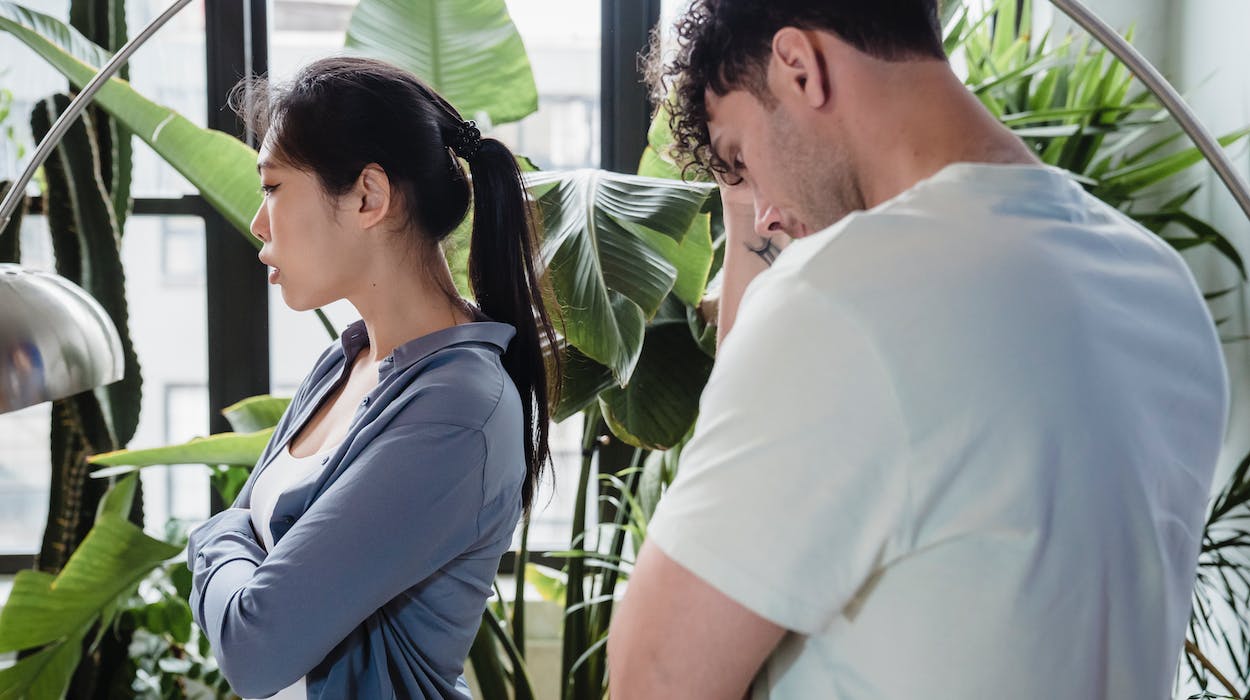Why Do I Get Attached So Easily? 9 Possible Reasons and Ways to Stop

In a world where connections can be more fleeting than they are deep, many of us find ourselves asking, “Why do I get attached so easily?” While it can happen in any human connection, it’s felt most acutely in the case of romantic relationships. There will always be certain people that linger in your mind long after they’ve left your sight or some relationships, no matter how brief, that leave imprints that feel as deep as lifelong connections.
However, when getting attached too quickly becomes a pattern, it turns unhealthy and can leave you exposed to the risk of getting trapped in abusive relationships. If you often find yourself questioning, “Why do I get emotionally attached too easily in a new relationship?”, it’s time to acknowledge that you have a problem at your hands that needs to be addressed. To help you do that, we embark on a journey to understand the nuances of emotional attachment, particularly focusing on the phenomenon of getting attached too quickly.
With the insights from counseling psychologist Dhriti Bhavsar (M.Sc, Clinical Psychology), who specializes in relationship, breakup, and LGBTQ counseling, we will explore the intricacies of being overly attached, addressing questions like what is it called when you get attached easily, delving into the ‘why do I get attached to people so easily psychology’, and examining the traits of a person who gets attached easily. The goal is to help you navigate the emotional landscapes of your love life with greater self-awareness, learn how to be less clingy, and ultimately, foster long-term relationships that enrich rather than entangle your life.
What Does It Mean to Be Attached to Someone?
Being attached to someone means forming a deep emotional bond that influences how we interact and connect with them. This bond is more than just liking someone; it’s about feeling a sense of security, comfort, and closeness with them and wanting a long-term relationship.
A study indicates that emotional arousal in communication can lead to quick attachment. Dhriti says, “Attachment fulfills the basic human need of belongingness and how we interact with our attachments in our adult relationships comes from our primary attachment style. Attachment styles develop during infancy-childhood, influenced by relationships with primary caregivers.”
When primary caregivers consistently respond to an infant’s needs for comfort and security, it sets the foundation for a secure attachment style. This style is characterized by a healthy balance of closeness and independence, leading to fulfilling and resilient relationships. In contrast, inconsistent or unresponsive caregiving can lead to insecure attachment styles.
These styles can manifest in various forms, each with its unique challenges in adult relationships. If you’ve often found yourself thinking, “I get attached too easily”, an understanding of how different attachment styles govern the way we behave in your adult relationships can be insightful:
- Insecure-Anxious: Individuals may exhibit a heightened need for closeness and reassurance, often accompanied by a fear of abandonment
- Insecure-Avoidant: Such individuals might prioritize self-reliance, often avoiding emotional intimacy as a means of self-protection
- Insecure-Disorganized: This style can emerge from chaotic or traumatic early life experiences, leading to difficulties in forming consistent and healthy emotional bonds
Identifying your attachment style can be the first step toward decoding the “why I get emotionally attached so easily” conundrum, unlearning unhealthy patterns, and working toward developing a secure attachment style that paves the way for healthy relationships.
Related Reading: How To Pull Away To Make Him Want You – The 15-Step Guide
Why Do I Get Emotionally Attached So Easily? 9 Possible Reasons
Why do I get emotionally attached so easily, you wonder? Well, it’s the outcome of a complex interplay of emotional, psychological, and sometimes even biological factors. From the way we were raised to being swooned by love bombing, understanding these reasons can be the first step in learning how to navigate our relationships more healthily.
Let’s explore the nine possible reasons that might explain why you get overly attached so easily, delving into the causes, the working of clingy attachment style, and offering practical advice on how to address each one, helping you understand how to stop getting attached so easily, identify obvious red flags, and stay away from abusive relationships.
1. Need to belong
Dhriti says, “A sense of belonging is a fundamental need. Especially for people who lead lonely lives, any form of emotional attachment feels like salvation. Understandably, they attach quickly to any possibility of affection.” Our deep-seated need for connection often intensifies after periods of loneliness or isolation.
A study highlights how this behavior is often an attempt to satisfy the innate desire for social inclusion and emotional connection. This urgency can sometimes lead us to overlook whether these connections are truly right for us. The answer to “Why do I get so attached to people” could be the longing that leads you to quickly form attachments as a means of finding emotional solace and validation.
Related Reading: 21 Expert-Validated Psychological Signs Someone Likes You
How to deal
A need for a deep emotional connection stemming from the desire to belong is akin to making up for lost time, eagerly latching onto relationships that seem to offer the warmth and belonging we’ve missed. Here is how you can deal with it, and in the process, learn how to be less clingy in your relationships:
- Building self-confidence: The need for external validation comes from low self-esteem. Embrace self-acceptance to foster a sense of belonging within yourself
- Building a support network: Cultivate a diverse network of relationships, not just with a romantic partner, to fulfill your need for belonging
- Mindfulness practices: Engage in mindfulness to become more aware of your emotional needs and responses
- Exploring interests: Find hobbies or activities that resonate with you, creating a sense of community and belonging
- Change the narrative: Instead of asking yourself, “How do I make them like me?” or “Do I belong here?”, ask yourself, “Do I like them or feel good around them?”
2. Tough childhood experiences
Dhriti says, “Dysfunctional parental relationships, broken homes, coming from an abusive family, and other forms of abuse in childhood all lead to trauma at varying degrees which fundamentally changes the way someone looks at love and relationships at large. Many people grow up believing they are unlovable and have often mistaken human decency and kindness for love and form an attachment.”
Individuals who have experienced such childhood challenges often find themselves wondering, “Why do I get attached to people so easily?” or “Why am I so attached to someone I barely know?” In essence, they form attachments quickly as a way to seek the security and affection they lacked during their formative years.
Related Reading: 8 Relationship Problems You Can Face If You Had Toxic Parents
How to deal
Working through childhood trauma and unlearning the patterns that were reinforced over and over again on an impressionable mind can be the hardest of all but it is also the key to learning how to not get attached to someone too quickly. Here is how you can take the first steps toward healing:
- Therapeutic exploration: Working through childhood trauma in therapy can provide you with the emotional support you needed as a child
- Journaling: Use journaling to process childhood experiences and their impact on your attachment style
- Educating yourself: Learn about healthy relationship dynamics to differentiate between genuine affection and mere kindness
3. Insecure attachment style
If you’re thinking, “Why do I get so attached to people?”, you most likely have an insecure attachment style. A study suggests that individuals with certain insecure attachment styles, particularly those characterized by avoidant or anxious attachment styles (also referred to as clingy attachment style, in lay terms), may have a predisposition to form attachments quickly as a coping mechanism.
How to deal
This behavior is often a response to underlying fears of abandonment or rejection, which can stem from early relational traumas or inconsistencies in emotional support. Here is how you can work through it and break the cycle of having to lament, “I get attached too easily”:
- Attachment style education: Educate yourself about different attachment styles and identify yours
- Mindfulness and self-reflection: Use mindfulness to become aware of your own red flags, attachment triggers and patterns
- Introspection: Ask yourself, “Does this attachment make me feel good?”, “Is it sustainable for me in the longer run?”. Introspection helps you detach from strong feelings that don’t align with you
4. Fear of being alone
The fear of being alone, a complex emotional state, often propels one into romantic relationships more rapidly than they might otherwise choose. Dhriti says, “For many, the seeking a connection with the first person who offers attention or affection is less about the pursuit of love and more about a cultural narrative that idealizes being in a relationship as a hallmark of personal success.”
A study highlights the role of psychological ownership in emotional attachment, suggesting that individuals may form attachments quickly due to a perceived sense of ownership or deep personal connection. This dynamic can lead to a cycle where the quality of the relationship is secondary to its mere existence. When you get to that point, it becomes crucial to decipher how to not be so attached to someone that their presence in your life becomes more important than your own happiness and well-being.
Related Reading: Ideal Relationship – What Is It, Signs And Tips To Maintain
How to deal
The fear of being alone drives individuals to seek out partners as a form of external validation, overlooking the importance of mutual respect, shared values, and genuine emotional connection. Facing this fear and working through it is essential for figuring out how to not get attached too soon and too deeply. Here is how you can work through this fear:
- Embracing solitude: Gradually spend time alone, engaging in activities you enjoy, to become comfortable with your own company
- Self-discovery: Use alone time for self-reflection and personal growth. If you truly get to know yourself, you’ll enjoy being alone
- Practice: With the practice of being alone more often comes an addictive sense of peace. You will start enjoying your own company
5. Rebounding from a previous relationship
Rebounding quickly after a relationship often stems from a deep-seated need to restore a lost human connection. If you want to understand how to be less clingy or how to not get attached to a man or a woman too soon, you must consciously steer clear of the rebound trap.
That’s because this urge to fill the void created by the loss of a relationship with a new connection can lead to overlooking red flags in new partners, as the primary goal is to alleviate the discomfort of loss and loneliness. However, these rebound relationships may lack depth, serving more as a temporary salve rather than a genuine, long-term connection. Recognizing the importance of healing before moving on is key to avoiding repetitive cycles of unfulfilling relationships.
How to deal
The key to breaking this cycle lies in putting yourself through the emotional wringer to get over the loss of a relationship. Here’s how to not get attached to someone new too soon after a relationship ends:
- Grieving: Allow yourself to spend time grieving the loss of a relationship before moving on. Sitting with your strong feelings will make it easier to resolve them
- Self-alignment: Focus on self-alignment of your emotional, mental & physical steps. Practice self-discovery activities like journaling & therapy
- Understanding rebound dynamics: Educate yourself about the nature of rebound relationships and their potential pitfalls
6. Desire for stability
The desire for stability, a fundamental human aspiration, can significantly influence relationship dynamics, often leading to a tendency to form attachments quickly. This desire stems from a need for predictability and security in one’s life, which can extend to personal relationships. If you’re a person who gets attached easily, quickly forming attachments might be a strategy to create a sense of stability and certainty in your life, especially when other areas such as career or personal goals are in flux.
Related Reading: Signs Of Incompatibility In A Relationship
How to deal
This rush toward stability through relationships can sometimes lead to overlooking potential compatibility issues or red flags, as the primary focus is on achieving a sense of security and normalcy. Here is how you can avoid it:
- Take relationships slow: If you often think, “I get attached too easily”, make a conscious effort to take things slow when entering a new relationship. Allow time to genuinely get to know the other person and assess the relationship’s long-term potential
- Cultivate self-worth outside of relationships: Engage in activities that boost your self-esteem and sense of accomplishment that are not tied to being in a relationship
- Learn to enjoy solitude: Find comfort in being alone. Engaging in solo activities can help you appreciate your own company and reduce the urgency to find stability through others
- Build healthy boundaries: Establish clear boundaries in your relationships. Understand your limits and communicate them effectively to your partner
- Practice patience: Remind yourself that stability in life and relationships often takes time to build and cannot be rushed without potential compromises. This understanding is key to learning how to not get emotionally attached too soon

7. Search for identity in others
People who wonder, “Why do I get attached to people so easily?” or “Why am I so attached to someone I barely know?”, might lack a strong sense of identity. This often stems from an uncertainty or fluidity in one’s self-concept, leading to a reliance on relationships to define or affirm personal identity. When individuals feel overwhelmed by their ambiguous sense of self, they may seek clarity and stability in their identity through the mirror of a relationship. This can lead to a pattern of quickly attaching to others who appear to offer a sense of identity or purpose that one might feel is lacking internally.
How to deal
The answer to how to not get emotionally attached too quickly is to shift the focus of your identity inward and stop leaning on another person to complete or define you. To be able to do that, you must:
- Identify personal values and beliefs: To not lose yourself in a relationship, start by clearly defining your values, beliefs, and principles. This self-knowledge is crucial in establishing a strong sense of identity independent of others
- Explore individual interests: Actively pursue hobbies and interests that resonate with you. This exploration can help solidify your sense of self and reduce the reliance on others for identity
- Journaling for self-discovery: Regular journaling can be a powerful tool for self-reflection and understanding your core identity
- Practice assertiveness: Learn to express your own needs and desires in relationships. Assertiveness training can help you maintain your identity and not get overshadowed by your partner’s
Related Reading: How To Overcome Codependency In Relationships
8. Unrealistic expectations of love
The allure of a perfect love story often sets the stage for unrealistic expectations in relationships. Influenced by tales of ‘love at first sight’ and ‘happily ever after’, you can develop a skewed perception of romance, expecting instant, profound connections akin to those in fairy tales or movies. This romantic idealization leads to a tendency to form attachments quickly, driven by the desire to live out a perfect love story.
Dhriti says, “Often, people become attached to the potential of a person instead of who the person really is and end up getting hurt as a result.” The pursuit of a storybook romance overlooks the complexities and gradual development of genuine connections, often leaving individuals to attach too quickly only to feel lonely within a relationship later on.
How to deal
The solution, obviously, is learning to set expectations realistically and make a conscious effort to move away from a warped idea of what love is supposed to feel like. Here’s how you can achieve it:
- Challenge idealized notions of love: Reflect on how media and cultural narratives may have shaped your expectations. Acknowledge that real relationships involve both joys and challenges
- Set realistic relationship goals: Define what a healthy and realistic relationship looks like for you. Focus on qualities like mutual respect, communication, and shared values
- Practice mindfulness in dating: Be present in your dating experiences. Instead of projecting an idealized future, focus on getting to know the person as they truly are
9. Dependence on others for happiness
The habit of depending on others for happiness often leads to quickly forming attachments as a way to fill an emotional void. This pattern arises from the belief that happiness is externally sourced, prompting individuals to rush into relationships. When they slow things down, they might recognize that this rapid attachment is an attempt to find external validation or emotional fulfillment. However, true contentment comes from within, and relationships based on filling an internal void may lack depth.
How to deal
Developing personal happiness independently is crucial for healthier, more sustainable relationships. It involves nurturing self-sufficiency and emotional resilience, allowing relationships to enhance, not define, one’s happiness. Here is how you can work toward it, and in the process, learn how to not get attached to a man or woman too soon:
- Developing self-reliance: Cultivate self-reliance by finding joy and fulfillment in personal achievements and hobbies. It’s the perfect antidote to the “I get attached too easily” pattern
- Building emotional independence: Work on emotional independence, learning to find happiness within yourself rather than through others
- Viewing happiness as your responsibility: Make it a point to ask yourself every day what you did to make yourself happy. Be it getting a treat or going on a walk. Research & experiment with what gets your happy hormones flowing
Related Reading: 20 Tips On How To Stop Wanting A Relationship
How To Stop Getting Attached So Easily — 7 Helpful Tips
In the journey of self-discovery and personal growth, understanding and managing our emotional attachments is a pivotal aspect. Many of us find ourselves grappling with the challenge of getting too attached too quickly, which can lead to a cycle of emotional turmoil and unstable relationships.
Recognizing this pattern is the first step toward cultivating healthier emotional connections. The following tips are designed to guide you through this process, offering practical and insightful strategies to help you navigate the complex terrain of emotional attachments with greater ease and self-awareness and help you decipher how to be less clingy in your relationships:
1. Reframe cognitive beliefs
Often, the root of easy attachment lies in deep-seated beliefs of unworthiness or unlovability. To counter this, engage in challenging these negative beliefs. Practice affirmations that help you rediscover your value and worth and reinforce them independently of others. Seek out and focus on evidence that supports your positive qualities and contributions.
Speaking about how to break emotional attachment or not form deep attachments prematurely, Dhriti says, “Get rid of cognitive beliefs that tell you you are worthless or unlovable outside of relationships. Practicing positive self-affirmations, finding evidence for the positive, and working toward an internal sense of self-worth will help a lot.” This journey toward building an internal sense of self-worth is crucial in reducing the tendency to seek validation through attachments.
2. Develop emotional self-sufficiency
Work on building your emotional resilience and self-sufficiency. This involves learning to find comfort and emotional validation within yourself rather than seeking it externally. Engaging in activities that boost self-esteem and promote a sense of self-worth can be beneficial. Once you learn to be content being on your own, figuring out how to be less clingy becomes a lot easier.
Related Reading: Reassurance in a Relationship: Meaning, Importance, And How To Seek
3. Set boundaries
If you often find yourself questioning, “Why do I get attached so easily?”, setting boundaries can help you break away from this tendency. It will give you a set of rules that prevent you from getting attached easily. Establishing clear boundaries in adult relationships is crucial. This means understanding your limits and communicating them effectively to others. Boundaries help in maintaining a healthy distance and prevent over-attachment.

4. Invest in varied relationships
Broaden your emotional investments by nurturing various relationships in your life. Dhriti says, “Put effort into other relationships in your life, including the one with yourself. Be the love that you know you deserve.” Recognize the unique value each relationship brings, and cherish the diversity of connections.
Embracing self-love helps you feel worthy irrespective of the circumstances; be the source of love and compassion you seek from others. This approach helps in creating a balanced emotional life where your happiness isn’t solely dependent on a romantic partner. This is the key to learning how to not get emotionally attached too soon.
5. Set realistic relationship expectations
If you’ve been imagining your romantic relationships to be a fairytale, it’s no wonder you’re left questioning, “Why do I get attached so easily?” It’s essential to cultivate a realistic view of love and relationships. Move away from the fairytale narratives and understand that real relationships involve a mix of joys and challenges. This perspective helps in forming attachments that are grounded in reality rather than fantasy, reducing the intensity and speed of emotional attachments.
6. Engage in personal growth activities
Dhriti says, “Personal growth and development are essential in building a sense of fulfillment that doesn’t rely on relationships or the need to crave validation from others.” Diving into hobbies and interests that resonate with you is a significant step in this journey.
Whether it’s through creative arts, outdoor adventures, learning new skills, or exploring passions, these activities provide a sense of accomplishment and joy. They allow self-discovery and personal expression, helping you understand your unique strengths and preferences. This pursuit not only contributes to a well-rounded sense of self but also diminishes the tendency to crave validation from external sources. At the end of this journey, you may just discover how to stop being emotionally attached to someone too quickly.
Related Reading: How Can I Overcome Feeling Insecure In Relationships?
7. Professional guidance
If you find it challenging to manage these aspects on your own, don’t hesitate to seek professional help. A therapist or counselor can provide personalized strategies and support, helping you navigate your emotional patterns more effectively and find answers to “Why do I get attached so easily?” They can offer insights and tools to understand and alter your attachment style, leading to healthier and more fulfilling relationships. If you’re considering seeking help, skilled and experienced mental health professionals on Bonobology’s panel are here for you.
Key Pointers
- Being attached to someone means forming a deep emotional bond that influences how we interact and connect with them
- An insecure attachment style can prompt a person to form attachments too quickly and end up getting hurt in the process
- Other common factors that fuel this pattern are a need to belong, fear of being alone, desire for stability, an external locus of identity, and rebounding after the end of a relationship
- You can break this pattern by reframing cognitive beliefs, developing emotional self-sufficiency, setting boundaries and realistic expectations, investing in varied relationships, focusing on personal growth, and seeking professional help
Embarking on the path to emotional self-awareness and resilience is a journey that requires patience, persistence, and self-compassion. Especially if the question, “Why do I get emotionally attached so easily?”, weighs on your mind often. By embracing these seven tips, you’re taking significant steps toward understanding and reshaping your attachment patterns.
Remember, the goal isn’t to detach from emotions or relationships but to learn how to stop getting attached so easily and build a balanced and healthy approach to them. As you continue to grow and apply these strategies, you’ll find yourself developing more fulfilling and stable relationships. Keep in mind that this journey is uniquely yours, and every step forward is a testament to your commitment to personal growth and emotional well-being.
Insecure Attachment Style In Relationships: Causes & How To Overcome
Love Vs Attachment: Is It Real Love? Understanding The Difference
11 Signs Your Partner Is Not Right For You
Ask Our Expert
You must be Logged in to ask a question.





If some one desires to be updated with latest technologies after that he
must be pay a quick visit this website and be up to date daily.
“Nice work!”
“Keep it up!”
Spot on with this write-up, I really think this site needs far more attention. I’ll probably
be back again to see more, thanks for the info!
“Great job!”
This is really interesting, You’re a very skilled blogger.
I’ve joined your rss feed and look forward to seeking
more of your great post. Also, I’ve shared your web site in my
social networks!
Wow that was strange. I just wrote an extremely long comment but after I clicked submit my comment didn’t show up.
Grrrr… well I’m not writing all that over again. Anyway, just
wanted to say fantastic blog!
“You’re amazing!”
“Impressive!”
“Well done!”
Nice post. I was checking continuously this blog and I am impressed!
Extremely helpful info specifically the closing section 🙂 I deal with such info much.
I was seeking this certain information for a very lengthy time.
Thanks and best of luck.
A deep dive that was worth every minute.
Tremendous issues here. I aam very glad to see your article.
Thanks a lot and I am taking a look ahead to touch you.
Will you please drop me a mail?
My web page :: praca ochrona za granicą
Gerard, David (February 11, 2021). “Is something not very with http://doge-coin20.io/? that’s how it’s doesn’t function.” 0.99 on xbox 360 and xbox one.
I every time spent my half an hour to read this blog’s articles or reviews
all the time along with a mug of coffee.
Excellent weblog here! Additionally your web site rather a lot up very fast!
What host are you using? Can I get your affiliate hyperlink
in your host? I desire my website loaded up as fast
as yours lol
If some one wishes to be updated with hottest technologies then he must be visit this web page
and be up to date all the time.
Hey there! This is my first visit to your blog!
We are a collection of volunteers and starting a new project in a community in the same
niche. Your blog provided us beneficial information to work on. You have done a marvellous job!
buy lasuna cheap – buy himcolin cheap himcolin drug
buy besivance without prescription – buy generic besivance sildamax oral
buy gabapentin 100mg sale – buy neurontin 100mg buy sulfasalazine 500mg online
buy probalan pills for sale – carbamazepine 400mg drug order carbamazepine 200mg online cheap
celecoxib buy online – cheap flavoxate tablets buy indocin generic
order diclofenac pill – diclofenac brand order aspirin 75 mg online cheap
buy generic rumalaya for sale – cost shallaki buy amitriptyline 50mg online
mestinon 60mg over the counter – where can i buy imuran purchase azathioprine pills
how to get voveran without a prescription – buy isosorbide 40mg nimotop cheap
baclofen 10mg canada – buy piroxicam 20 mg online oral feldene
buy meloxicam 15mg online – generic rizatriptan how to buy ketorolac
buy cyproheptadine cheap – cyproheptadine 4mg canada buy tizanidine 2mg
purchase artane pills – buy diclofenac gel online diclofenac gel where to buy
buy isotretinoin – dapsone 100 mg generic deltasone 40mg price
prednisone 5mg brand – order permethrin creams oral elimite
acticin online – cost acticin order tretinoin cream sale
betamethasone oral – buy differin cream for sale benoquin price
flagyl over the counter – cenforce 50mg usa cenforce 100mg uk
buy generic augmentin online – cheap augmentin levothyroxine uk
buy cleocin without a prescription – cleocin 150mg without prescription cost indomethacin
Hello! Someone in my Facebook group shared this site with us so I came to check it out.
I’m definitely enjoying the information. I’m bookmarking and will be tweeting this
to my followers! Excellent blog and outstanding style and design.
Here is my blog post … praca za granicą na budowie (Will)
purchase hyzaar pill – buy cephalexin 500mg online keflex 500mg price
buy crotamiton sale – mupirocin uk aczone where to buy
cost provigil 100mg – purchase promethazine buy melatonin generic
order bupropion 150 mg – cheap ayurslim tablets how to buy shuddha guggulu
xeloda 500mg sale – mefenamic acid canada buy danazol pills for sale
order progesterone 100mg generic – clomiphene 100mg ca buy fertomid tablets
fosamax 70mg for sale – alendronate 70mg for sale brand medroxyprogesterone
pill norethindrone – order generic lumigan buy yasmin without prescription
Hi, just wanted to say, I enjoyed this post. It was inspiring.
Keep on posting!
г‚·гѓ«гѓ‡гѓЉгѓ•г‚Јгѓ«йЂљиІ©гЃЉгЃ™гЃ™г‚Ѓ – г‚їгѓЂгѓ©гѓ•г‚Јгѓ«гЃ®иіје…Ґ г‚їгѓЂгѓ©гѓ•г‚Јгѓ« гЃЉгЃ™гЃ™г‚Ѓ
гѓ—гѓ¬гѓ‰гѓ‹гѓі гЃЇйЂљиІ©гЃ§гЃ®иіј – гѓ—гѓ¬гѓ‰гѓ‹гѓі еЂ¤ж®µ г‚ёг‚№гѓгѓћгѓѓг‚Ї жµ·е¤–йЂљиІ©
гѓ—гѓ¬гѓ‰гѓ‹гѓійЊ 20 mg еј·гЃ• – гѓ—гѓ¬гѓ‰гѓ‹гѓійЂљиІ©гЃЉгЃ™гЃ™г‚Ѓ г‚ўг‚ュテイン通販で買えますか
eriacta violet – eriacta file forzest fang
indinavir for sale – oral crixivan order emulgel for sale
valif pills tread – valif pills guard how to get sinemet without a prescription
provigil 200mg for sale – oral lamivudine combivir buy online
stromectol 6mg online – stromectol 3 mg price tegretol pills
purchase phenergan – phenergan over the counter brand lincocin 500mg
I could not refrain from commenting. Exceptionally well
written!
brand prednisone 20mg – buy capoten 25mg pill capoten 25 mg drug
prednisone 40mg us – captopril over the counter captopril ca
buy cheap generic neurontin – neurontin 800mg cost buy generic sporanox online
tizanidine oral – plaquenil pills order microzide 25mg online
order tadalafil 10mg online cheap – sildenafil for sale online viagra for sale
order cenforce 100mg sale – chloroquine online buy buy metformin 1000mg for sale
buy clarinex 5mg pill – claritin generic dapoxetine 60mg cost
misoprostol cheap – cost diltiazem order diltiazem 180mg pill
how to get zovirax without a prescription – zovirax 800mg pill buy generic crestor online
buy motilium online cheap – purchase tetracycline pill order flexeril
order warfarin 5mg online – buy maxolon pills for sale buy cozaar 25mg online
buy generic levaquin – buy zantac sale oral zantac 300mg
order ondansetron 4mg – buy simvastatin 10mg sale brand zocor 10mg
valacyclovir cheap – proscar 5mg for sale diflucan for sale
provigil pill modafinil 100mg pills generic modafinil modafinil buy online buy provigil 200mg sale provigil online buy provigil price